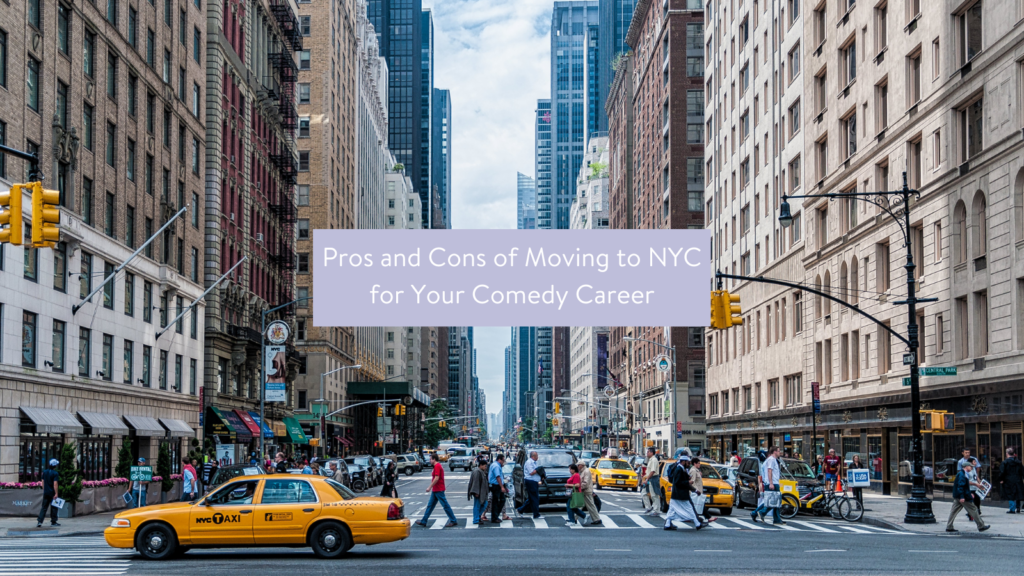How to decide where to live for your comedy career

While other comedy scenes have been growing around the online and physical world, NYC and LA are still widely thought to be the capital cities of comedy. So should you relocate there for your comedy career?
I moved from Boston to NYC when I was sure comedy wasn’t just another thing that I’d get obsessed with and then burn out and give up. (Unfortunately, that is a pattern for me.) I’m really happy with my decision, but that doesn’t mean it’s right for everyone.
Based on my experience, countless post-show/mic talks with other comics, and a survey I sent out (after eliminating the trolls, there were 25 genuine responses), here are the most commonly cited pros and cons for moving to NYC or LA for your comedy career.
Cons of Smaller Scenes
- Small town drama/Gatekeepers
In NYC, everyone is too busy and knows too many people to keep track of much drama, but smaller markets have all the time and the “cool kids” to turn open mics into a high school cafeteria.
- Limited open mics
Getting up frequently is the biggest factor in whether a standup will get good, and it can be really challenging in a smaller market, especially if you have a weird work schedule.
- Longer travel to audiences
If you are committed to getting up as much as possible you may need to travel longer distances for shows and clubs.
- Wondering “what if”
Would you have gotten to do a lot better rooms? A standup special? A sitcom? Sometimes the wondering is more disappointing than trying and having it not work out.
Cons of NYC and LA
- Money, honey
You can’t talk about moving to NYC or LA without lamenting how expensive they are. “It costs all of your money to live here (NYC), and some you don’t have too,” said Justin Thompson, who previously lived in Atlanta and South Carolina.
This creates an environment where a lot of comedians are spending more time at a day job and/or multiple side hustles and less time actually pursuing comedy. That, or forgoing important things like sleep, mental health, fun, and friendships/dating outside of the comedy community. (This isn’t a recommendation to not prioritize these things, just a note about what can happen.)
- Lots of competition
The sheer number of comedians in NYC and LA can be overwhelming to think about. Some days, I’m convinced that up to a quarter of NYC’s 8 million people want to be comedians. There’s no actual comedy census I can reference, but I know at least 300 NYC comedians personally (a small subsection of the scene) and there are new people moving to NYC or LA all the time (even at the height of the pandemic).
Jumping from open mics to booked shows can be especially challenging in these over-saturated markets, even for comedians who’ve already developed a strong comedic voice and have the credits to show for it. Comedians who are used to getting booked shows in their current market can feel like they’re taking a painful step backward when they have to focus on going to mics and networking at shows.
Cons of NYC
- New York City is crowded
It’s fast-paced. It’s sometimes smelly. All the stimuli and pressure to go, go, go can be overwhelming. If you’ve ever been to NYC, I think you have a pretty good idea if this is an environment you’d be happy living in or not.
- Predatory show and open mic producers
While there are free and low-cost open mics, it can take time/networking to find them. Unfortunately, Google searches tend to bring up higher-cost options that may not be sustainable for struggling comics to do regularly (these are usually lower in quality as well). Facebook groups are a good way to hear about new mics to try.
There are also producers of bringer “shows” that will require you to bring a certain number of people (and have those people buy two drinks each) to perform. There are a few bringers that can be worthwhile because they’re one of the few ways to get in front of bookers for the actual club shows, but most of them are not worth your time.
I’d advise networking/going to mics/hanging out at indie shows for a few months to get the scoop about which ones are worthwhile/what the particular booker is looking for before agreeing to any. There are a lot of “bringer” shows that claim they will get you in front of a particular booker or in consideration for something and are flat out lying.
Cons of LA
- LA is the nation’s traffic capital
It’s almost mandatory to buy a car if you live in LA, and you’re going to spend a lot of time sitting in traffic in said car.
Since everything is more spread out, you won’t be able to hop from mic to mic or show to show as easily as in NY. This limit on stage time can make it harder for newer comics to develop their voice and make new friends.
- Actors
A handful of survey respondents cited “actors doing standup” as a con. While there are plenty of good comics who started off in theatre or film acting, it’s not always an easy transition to a medium that’s almost entirely about writing.
There’s some resentment among comics who’ve been put in work on their craft when actors come in who are doing it to get more auditions/because an agent or manager told them to, rather than because they want to write good jokes. There’s also a sentiment that actors’ increased social media following, good looks, and credits (that are irrelevant to standup comedy), get them booked on shows that they don’t yet have the skill to perform on.
To be fair, it’s also not uncommon for comedians who’ve advanced to a certain level to take acting roles without studying the craft.
Pros of NYC
- Stage time
It’s not unheard of for comics to do 3 mics per night in NYC. (Though it’s debatable how many mics you can do before it’s not helpful anymore.) There are mics every day, morning/afternoon/night/late-night/in between periods. As someone who’s not the best at planning things, it’s nice that I can usually find somewhere to get up at the last minute.
- Multiple theatres
There are also a ton of indie shows and clubs. “When I hosted a show in NYC, I’d need to book comics for highly-specific times, because they might be doing 6, 7, 8 shows a night,” Bill Connolly, who started comedy in Boston and has lived in both NYC and LA, said via the survey.
Not only does NYC itself have a lot to offer, but it also has “easy access to other comedy hubs such as Philly, DC, and Boston,” said Heidi Grandberry, who moved from Chicago to NYC.
- People want you to succeed
There’s a stereotype that New Yorkers are mean/rude/hit-cars-with-their-fists-and-shout: “I’m walkin’ here!” In my experience, most people are nice. Your peers generally want you to succeed. (And only in part because when one rises to the top, so do those behind them!)
You never know who might book you on a show, get cast in a project with you, or let you know about an opportunity, so it pays to be kind.
- Etc., etc., etc.
Other common survey responses were lots of funny people you can collaborate with/get inspired from, a sense of community in comedy, a high bar for joke writing, and meeting people with diverse interests/life experiences outside of comedy.
Pros of LA
- Hollywood
LA is the main place to be if acting or writing for TV is your end goal. Almost every sitcom films in LA and requires that its writers be based there. Getting a Writer’s Assistant or a PA position is one path to TV writing and LA is the place to get those jobs.
- Auditions galore
There are also more commercials filmed in LA than in NYC.
- Sunshine and California babes
The weather was mentioned a few times on the survey and I can personally attest that grinding in NYC is much harder when you’re wading through dirty, half-melted, snow-slush in the winter.
“Truly moved to LA cuz I had seasonal depression and I like LA as a city,” reported Kristen Cunningham, who relocated from Detroit.
- Etc., etc., etc.
Other responses included a more laid-back vibe than NYC, quality of life/general interest in wellness, and well known comedy venues.
Pros of Smaller Scenes
- Getting to the top
In NY and LA, there are clear levels of success, but there are also too many comedians, too many scenes, too many people doing wildly different things for there to be a true “top dog”. In a small scene, there is often a clear person or group of people at the top. If you have the qualities that your particular market is looking for, you could become the go-to person for limited industry opportunities that come through, booked shows, etc. (Use your power wisely.)
- Pioneering
If there isn’t a thriving comedy community in your area, you may be able to start one. No matter where you are, there’s probably someone else who also wants to do comedy nearby.
- Chillaxing
Since not everyone in a smaller scene is striving to do comedy professionally, there can be less pressure to always put on a great performance, and more comfort with experimenting.
- Money, the remix
In some instances, it’s possible to get paid more in the beginning in a smaller scene, especially if there aren’t.
Pros of Both NYC and LA:
- Industry presence
There are more agents, managers, casting directors, producers, and people who could introduce you to said industry folks in NYC and LA than in any other cities. You can get discovered anywhere, but as screenwriter Craig Mazin* said when asked if aspiring screenwriters should move to LA: “If you want to get struck by lightning, you should go where lightning strikes more frequently.”
- Variety of scenes
In smaller markets, a handful of open mics and booked shows may be the sum total of live comedy. In NYC and LA, there are specific microcosms of comedy: an improv scene, sketch, writing groups for screenwriters/TV-writers/people who want to write comedy articles, experimental comedy, and various factions within standup that there aren’t agreed upon names for. If you’re not gelling with a particular group of people or comedic style, there may be another (close by!) scene where you thrive.
*Craig Mazin hosts a podcast about screenwriting called “Scriptnotes” with fellow screenwriter John August that’s great to check out if that’s something you’re interested in.
Laura Merli is an NYC-based standup, actress, and writer. She’s amassed over a million likes on Tik Tok and continues to grow her following every day. She’s appeared in the Rogue Island Comedy Festival, the Women in Comedy Festival, was the first runner-up in The Ladies of Laughter standup competition, and hosts a monthly show (Good Girl) at one of the hottest alt-comedy spots in Brooklyn, Friends & Lovers.
As someone who didn’t start comedy until their late 20s, Laura has held a wide variety of odd jobs including cashier, eBay store photographer, project manager, zombie in an escape room, business analyst, and carnival worker (her grandparent’s family business). She has since written for and acted on sketch house teams at the PIT and Improv Boston. She’s also been a contributor to Reductress, The Hard Times, and McSweeney’s.
You can watch videos of her current sketch team, Soul Crush, at youtube.com/soulcrushcomedy.
